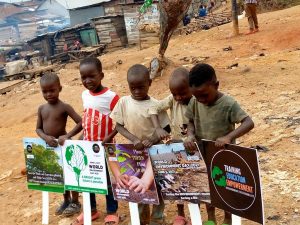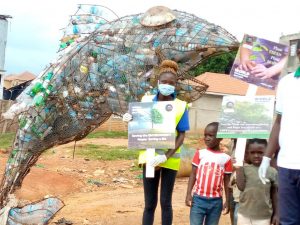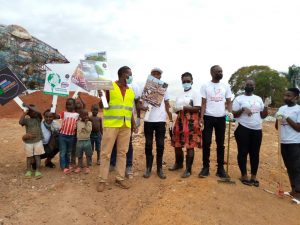On June 5, 2021, the Global Green Growth Institute in collaboration with the Kampala Capital City Authority (KCCA) and key environmental activists/ Civil Society Organizations conducted a one-day outreach at the Ggaba beach market and landing site, a suburb in Kampala Central Division to commemorate the World Environment Day 2021. The purpose of the outreach was to sensitize the fishing communities and beneficiaries on the importance of proper solid waste disposal, proper waste sorting, the economic importance of waste as well as keeping the lake waters free from waste.

The CSOs in attendance, also part of the “Green Champions” Group, were Shelter and Settlement Alternatives, TEENS Uganda, Repair the Earth, and Compassion for Humanity who were joined by the Beach Management, Local Market Council, and the Vendors from the Ggaba Market.
Daily, the Ggaba market hosts a total population of over 400 vendors recording waste of about 50 tonnes which is not properly managed. The issue of waste management is an environmental challenge and a matter of concern to the beach dwellers.
The market leadership expressed dissatisfaction that vendors, after so many years, still face the challenge of waste management. They confirmed that the self-help approach is relevant to teach the vendors how to keep the market and landing site free from waste. The impact of improper solid waste management goes beyond health and environmental problems.

A case in point is the Kampala City Council Authority which collects about 1,300 tonnes per day. This translates into 468,000 tonnes per annum representing about 40% of solid waste collected in the country. It is estimated that only 68% of the solid waste generated in urban areas is collected and safely disposed of.
The rate at which Rivers and Lakes are silting is threatening some of them to disappear altogether. This has increased the cost of treating water for human consumption.
What Green “volunteers/ champions” found on this beach illuminates the scale of marine plastic problems and the potential for solutions. “Beach Cleanups are personal and local”, said the Local Council Leaders, “we need the communities to understand why they need to engage in these activities. There is a realization in knowing that the lake is being less polluted by our individual actions instead of waiting on the government.”

The Uganda Green Growth Development Strategy (UGGDS) continues to highlight that one of the major problems with water resources in Uganda is water pollution. This is caused by bacterial and chemical contamination of both ground and surface water resulting from inadequate sanitation facilities and unsafe disposal of municipal waste, industrial waste, poor farming practices, and degradation of the water catchment areas.
In its continued efforts and together with the Local Governments, GGGI aims at improving solid waste management and producing high-quality organic manure in Uganda for use on farms, and reduce the Green House Gas emissions through the different interventions under UGGDS.
#BuildUG2gether Proper education of the public, the provision of more communal trash bins, and the collection of waste by private contractors could help prevent exposing the public in municipalities to diseases @KCCAUG @PSF_Uganda @nemaug @GCICUganda https://t.co/cdOQpd2Nqo
— GGGI Uganda (@GggiUganda) June 15, 2021
More tweets:
We joined @KCCAA and a group of CSOs in Uganda, believers of change at #Ggaba Beach to #Commemorate the #WorldEnvironmentDay2021
Creating awareness on dangers of #plasticpollution, #solidwaste management #spreadtheword@EUinUG @teensuganda @repairtheearth pic.twitter.com/XCZR6iZsPw— GGGI Uganda (@GggiUganda) June 5, 2021